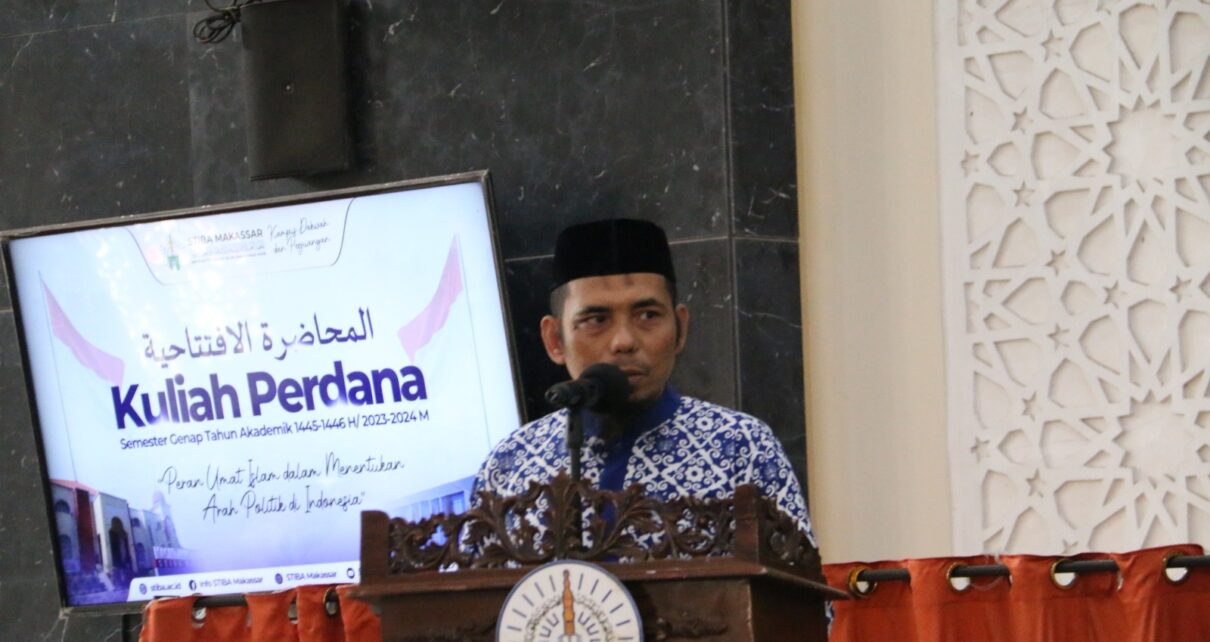
The Chairman of the Senate of the College of Islamic Sciences and Arabic Language (STIBA) Makassar, Ustaz Muhammad Yusran Anshar, Lc., M.A., Ph.D., opened the inaugural lecture at STIBA Makassar. In his speech, he highlighted a theme that had never been precisely discussed in previous inaugural lectures, which is the “Role of the Muslim Community in Shaping the Political Direction in Indonesia.”
The Chairman of the Senate also emphasized the importance of knowledge in Islam. He quoted a Hadith of the Prophet (peace be upon him) stating that seeking knowledge is obligatory for every Muslim. However, the question that arises is what knowledge should be considered obligatory for us.
“There is individual obligation (fardh ‘ain) and communal obligation (fardh kifayah). When does knowledge become a fardh ‘ain? Knowledge becomes a fardh ‘ain when it is highly needed,” he said.
Furthermore, Ustaz Yusran discussed the upcoming elections. He encouraged students to take a stance in choosing suitable leaders. Students are expected to be able to determine their position and who is worthy of being chosen after this inaugural lecture.
Ustaz Yusran also stressed the importance of learning from the verses of the Quran recited by the qari during the event, specifically Surah Al-Baqarah related to leadership, particularly in the story of Prophet Ibrahim (peace be upon him).
In that verse, Allah Subhanahu wa Ta’ala said to Prophet Ibrahim, “Verily, I will make you an imam (a leader) for mankind.” However, according to Ustaz Yusran, it should be noted that Allah tested Prophet Ibrahim before granting him leadership. This serves as a reminder that true leaders are those who pass tests and challenges successfully.
He also quoted Imam Shafi’i’s statement, “Laa yumakkan hatta yubtala,” which means that ideal leaders are those who have successfully undergone trials.
Another lesson from the story of Prophet Ibrahim highlighted by Ustaz Yusran is the importance of a leader’s devotion to Allah. Prophet Ibrahim, for instance, was entrusted with the management of the House of Allah, a place of worship. This demonstrates that leaders should serve as role models in worship and facilitate their followers’ closeness to Allah. Ideal leaders are consistent in performing acts of worship, such as prayer, and can even lead their followers in prayer.
The importance of prayer in leadership is another lesson drawn from the story of Prophet Ibrahim, as he prayed for the blessing of the city of Makkah. His prayer demonstrates his concern for the city and his desire for it to be blessed by Allah Subhanahu wa Ta’ala.
Ustaz Yusran also highlighted Prophet Ibrahim’s thoughts on leadership. He realized that not all of his descendants were entitled to leadership; Allah revealed that only those who were obedient to Him among his descendants would be eligible for leadership.
Furthermore, Ustaz Yusran discussed the importance of leaders in considering the future of the next generations. Prophet Ibrahim, for example, prayed for Allah to send messengers among their descendants. This emphasizes the importance of raising a generation strong in faith and obedience to Allah.
The final point of reflection from the verse recited in this inaugural lecture is the message about the importance of understanding history and contributing to the community. The verse mentioned, “tilka ummatun qad khalat lahā mā kasabat walakum mā kasabtum walaa tusʼalu̱na ʿan mā kānū ya’amlu̱n,” reminds us that past communities had their own roles and contributions, and we will not be held accountable for their actions.
Ustaz Yusran added that the main message to be taken from this verse is that we should not only boast about our ancestors or claim famous lineage but focus on what we have contributed to our community. History should not only be remembered but also serve as inspiration to create a better future.
“May Allah Subhanahu wa Ta’ala bestow upon us leaders of guidance, leaders who show the way to goodness and bring positive change to our community. May Allah continually bless our nation, our people, and, most importantly, may we be part of that transformative element,” concluded Ustaz Yusran Anshar in his closing remarks before officially opening the Second Semester Inaugural Lecture at STIBA Makassar.
![]()
